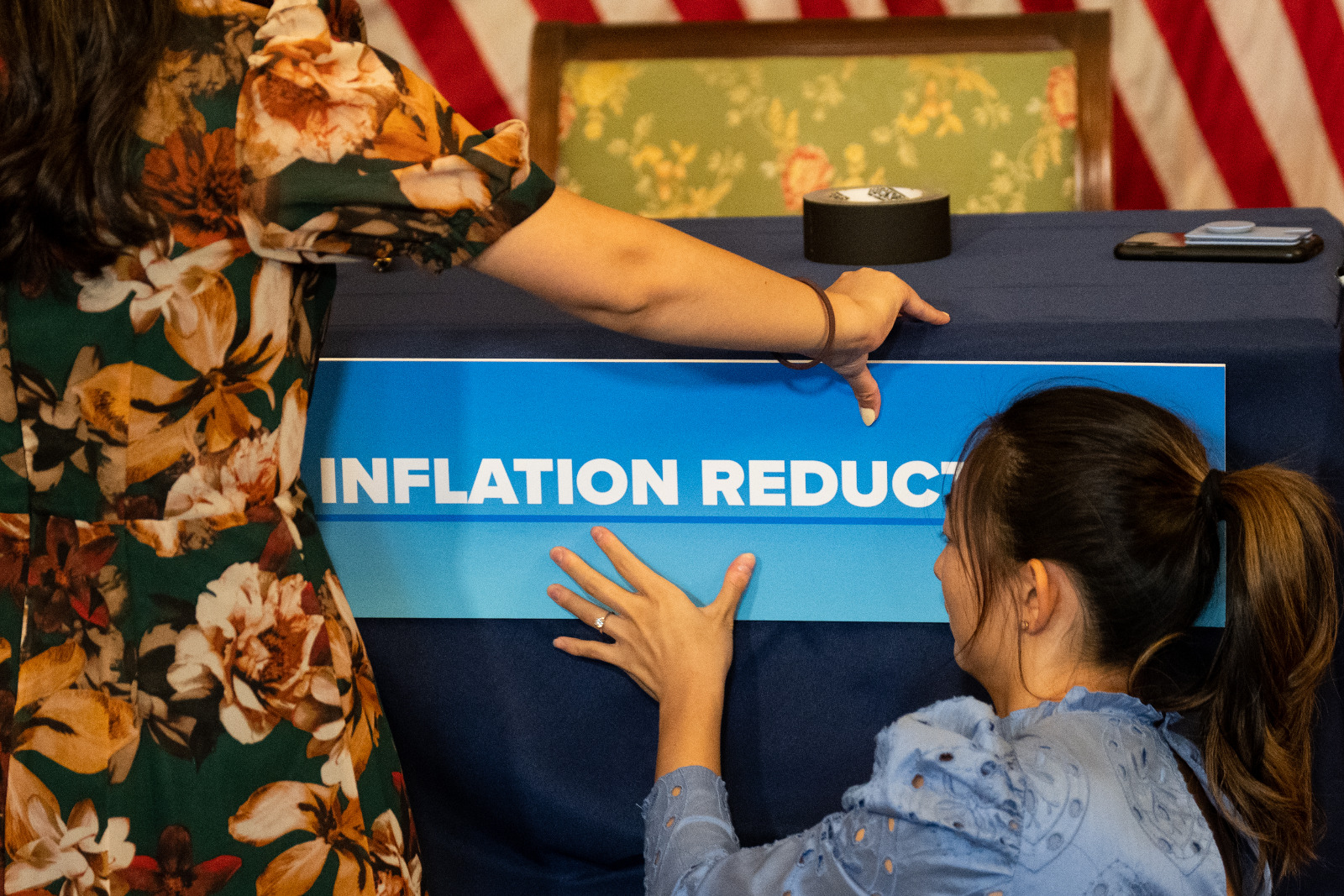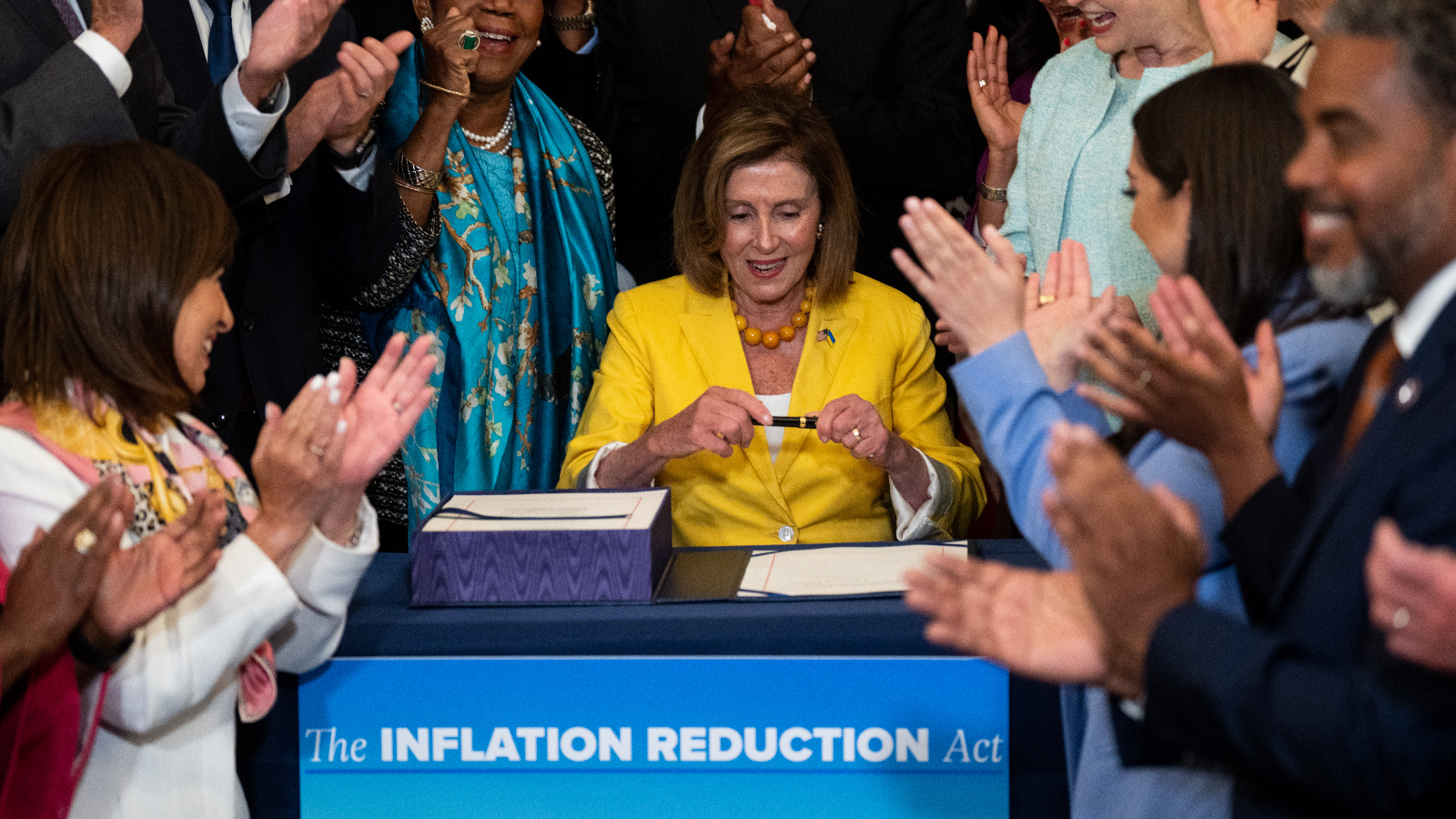Let’s say you had the chance to name the biggest effort to tackle climate change in United States history. What would you call it?
Democrats got that rare opportunity in August 2022, two years ago this week, when they passed legislation putting nearly $369 billion into investments in renewable energy, electric vehicles, energy-efficiency upgrades for homes, and other green technologies. When the legislation emerged from negotiations with then-Democratic Senator Joe Manchin of West Virginia, the key holdout, it had a surprising name: the Inflation Reduction Act.
Even though inflation rates were soaring, the law wasn’t supposed to do that much to counter rising prices in the near term, though it did include provisions to allow the government to negotiate prescription drug prices and help Americans afford health insurance. What it was mainly supposed to do was address climate change — by one estimate, cutting greenhouse gas emissions 40 percent below 2005 levels by 2030.
Since President Joe Biden signed it into law, the Inflation Reduction Act, or IRA, has seen tangible results. Last year, some 3.4 million families took advantage of tax credits for clean energy and energy-efficiency upgrades, according to recent data from the Treasury Department. That translates to 750,000 homes newly outfitted with rooftop solar panels and almost 270,000 homes with energy-efficient heat pumps. Companies, buoyed by the legislation’s incentives, have invested $360 billion into making batteries, solar panels, wind turbines, and other technologies.
But ask the average American what they think of the country’s landmark effort to take on climate change, and you might get a blank stare. About 4 in 10 registered voters say they’ve heard “nothing at all” about it, according to polling done this spring by Yale University and George Mason University.
As the 2024 presidential election approaches, Democrats aren’t getting much credit for climate action from the voters who care about it. Just over half of liberal Democrats say they haven’t heard much about the IRA. “That raises real red flags for me because, again, this is the base of your party,” said Anthony Leiserowitz, the director of the Yale Program on Climate Change Communication. “These are the people who are, in fact, the most attuned to politics and follow along with political news. And they don’t know about it.”
Congress once named bills more intuitively — think of the Clean Air Act of 1970. But the IRA follows a more recent tradition of carefully branded environmental bills, with Democrats emphasizing positive qualities they hope will resonate across the political spectrum. Only rarely do those positive qualities include the word “climate.” In 2009, for example, an effort in Congress to adopt a national cap-and-trade system to limit carbon emissions went by the name “American Clean Energy and Security Act.”
This hesitancy to talk about climate change directly may trace back to a fundamental bias in American politics, Leiserowitz said. Most people, including politicians, believe that climate action is far more unpopular than it really is. In reality, the majority of Americans are already alarmed or concerned about climate change, and want to do something about it.
Leiserowitz goes so far as to call the Inflation Reduction Act a “communication failure,” one that could have implications for the presidential election this November. While addressing climate change isn’t generally the main issue on voters’ minds, a poll last year found that it was the third-place priority for younger voters, tied with preventing gun violence, topped only by economic concerns such as inflation and jobs that pay a living wage.

Bill Clark / CQ-Roll Call via Getty Images
The good news for Democrats — and Vice President Kamala Harris, now the party’s presidential nominee after Biden dropped out of the race in July — is that when people hear about the IRA, they tend to like it. Among those who say climate change is one of their top voting priorities, 97 percent supported the law after reading a short description of it.
Now, with just three months to go until the election, it’s sure to be even harder to cut through the news cycle with a message about climate action. “If they wanted to gain the benefits of having passed this truly world-changing legislation, they frankly should have been communicating it over the past two years,” Leiserowitz said. Aside from the lack of political attention and media coverage, there’s another challenge to communicating the IRA’s benefits: People rarely encounter them firsthand. The tax incentives go toward things that aren’t frequent purchases, like electric vehicles and heat pumps, said John Marshall, the CEO of Potential Energy, a nonprofit climate marketing firm.
But the Inflation Reduction Act’s messaging problem started with its title. “Most people are never going to learn anything more about it than the name itself,” Leiserowitz said. “They lost the first and greatest opportunity they had to communicate, if the goal was to emphasize the climate piece.” People aren’t connecting the dots: In a survey in April, which didn’t provide much context about the law, only 16 percent of Americans said they thought the IRA was helping to address climate change.
Many journalists initially resisted the name, using it sparingly in their articles, and often only to fact-check whether the bill would actually reduce inflation, said Angela Bradbery, a communication professor at the University of Florida. She pointed to an Associated Press article in 2022 that characterized the legislation as “Democrats’ flagship climate and health care bill” — a more accurate description, in Bradbery’s opinion. Biden has admitted that the IRA’s name was a missed chance. “I wish I hadn’t called it that,” he said during a speech last August.
Much effort has been spent trying to conjure the magic words to “reframe” climate change to drum up more public support for political action, pointing to side benefits that would help the economy or public health (or inflation). As Biden often puts it: “When I hear climate change, I think jobs.” Yet that impulse may be misplaced. “That’s not why people think we should be taking action on climate change,” Leisorowitz said. “It’s about protecting the people, places, and things that we love. … This could destabilize civilization, and we’re talking about a few hundred thousand jobs it’s going to create?”
For the Inflation Reduction Act, a simple message resonates with people, according to Marshall’s marketing research: emphasizing that it’s a landmark achievement to tackle climate change.
The urge to overthink communication, Marshall suspects, comes from the fact that climate change takes decades to solve. “We as humans naturally get impatient with, ‘Oh, that message didn’t work. We still have climate change. Let’s try another,’” he said. “And the most important thing in marketing and messaging is you pick a thing and just stick to it, and you have conviction around it.”



